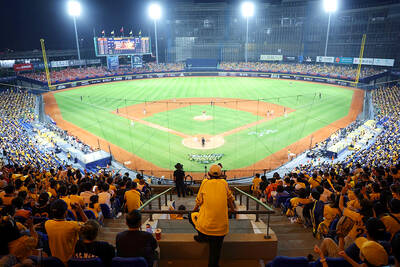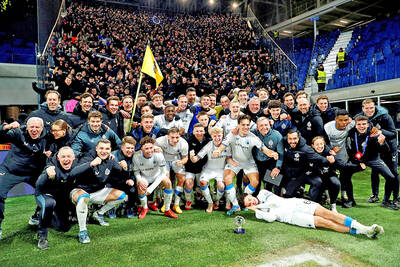One year on from winning the race to hold Euro 2012, Poland and Ukraine are under mounting pressure from UEFA to step up efforts to get ready for the soccer showcase. In the face of repeated warnings from European soccer’s governing body about the mammoth task, both countries have been pushed on to the defensive.
On April 18, last year, UEFA raised eyebrows by choosing Poland and Ukraine over Italy and joint bidders Hungary and Croatia to host the quadrennial, 16-nation European championships. It will be the first time either has run a major tournament — and in Poland it is seen as a way to improve the image of the domestic game, tarnished by match-fixing. It also marks UEFA’s first big foray into the ex-communist bloc, where stadiums, hotels and transport are undergoing a major upgrade — with an estimated price tag of 42 billion euros (US$67 billion) in Poland and Ukraine.
UEFA chief Michel Platini has been turning up the heat, urging the hosts to “protect the credibility” of Euro 2012, and last month issued a new “wake-up call.” UEFA recently sent inspectors to Poland, but has refused to comment on their findings. According to leaks in the Polish press, they noted a “speeding up” of overall plans, but were deeply concerned about the stadiums.
They spotlighted a “very high risk” that the new, 55,000-seat venue for the opening match, in the heart of Warsaw, would not be ready. Michal Borowski, who is in charge of the 400 million euro state-funded project, this week played down the worries.
“The stadium should be delivered by 2011. That’s a little later than promised by the government. But there’s no other chance of doing it before,” he told reporters.
high risk
UEFA also allegedly pointed to a “high risk” in the Baltic port of Gdansk, but saw progress in Poznan and Wroclaw. Wroclaw’s mayor, Rafal Dutkiewicz, said things were going “quite well,” with the 44,000-seat stadium there due to open by the end of 2010.
The stadium situation looks better in Ukraine. Kiev’s main ground is already being transformed into an 85,000-seat venue for the final. To the east, work is winding down in Dnepropetrovsk, with a new 50,000-seat arena set to open this summer, while a similar-sized venue in Donetsk should be ready by the end of the year. Some local authorities are gloomy, however.
“Preparations for Euro 2012 are going worse and much slower than they could be,” said Donetsk’s mayor, Alexander Lukianchenko.
Infrastructure remains a major worry. Currently, the 1,900km trip from Gdansk to Donetsk requires serious stamina. A lucky driver can do it in 23 hours — not counting the wait at the border — with just 23km of motorway and most of the rest on single-lane roads. It’s worse by train: the trip takes 43 hours, at best.
motorways
Despite major EU funding since the fall of communism in 1989 and Poland’s membership of the bloc in 2004, the country still hasn’t built a basic motorway network between its major cities. The situation is worse in Ukraine. Polish authorities aim to build 1,100km of new motorway nationwide by 2012. Since last April, however, they have tallied just 35km. Among other concerns are new airport facilities and hotels.
The sluggishness was an election issue last October, when Poland’s liberals, led by ardent soccer fan Donald Tusk, beat the country’s conservatives.
Polish businesses, however, complain that despite pledges, Tusk has done too little to cut the red tape hampering preparations.
“There hasn’t been the necessary legislation to smooth the organisation of Euro 2012,” said employers’ federation boss Andrzej Malinowski.
Tusk, however, has affirmed he is “100 percent convinced” things will be fine.
“Speaking frankly, over the past year we could have done much more,” said the Ukrainian Football Federation’s chief Grigory Surkis, blaming the political instability that has gripped his country. But striking a positive note, he said: “I’m sure we will succeed.”

Taiwan kept its hopes of advancing to the 2026 World Baseball Classic (WBC) alive with a 9-1 victory over South Africa in a qualifier at the Taipei Dome last night, backed by solid pitching. Bouncing back from Friday’s struggles on the mound, when Taiwanese pitchers surrendered 15 runs to Spain, Team Taiwan kept the visiting team in check, allowing just one run in the bottom of the fourth inning. The win was crucial for Taiwan, as a loss would have eliminated the team from contention for the next WBC. Starting pitcher Sha Tzu-chen (沙子宸) struck out one and allowed no hits, except for

The Chinese Professional Baseball League (CPBL) is considering reducing its pitch clock by two seconds to help players better adjust to the rules applied at the World Baseball Classic (WBC). The proposal aims to shorten the pitch timer from 25 seconds to 23 seconds with the bases empty, and from 20 seconds to 18 seconds with runners on base. Currently, the WBC mandates that pitchers deliver a pitch every 18 seconds with the bases empty and 15 seconds with runners on base. The issue was raised during a pre-season CPBL managers’ meeting on Tuesday by Rakuten Monkeys bench and batting

‘SETTING THE TONE’: Donovan Mitchell said that their determination to dominate had nothing to do with past results, but was about a potential post-season clash The Cleveland Cavaliers on Friday boosted their NBA-best record with a 142-105 romp past the New York Knicks, tightening their grip on the Eastern Conference lead with an all-around dominant display. Donovan Mitchell scored 27 points to lead six Cavs players to score in double figures, connecting on five of seven three-pointers as Cleveland drilled 19 from beyond the arc. “I think the biggest thing was just try to set the tone early,” Mitchell said, adding that the determination to dominate had nothing to do with the Knicks’ first-round playoff win over the Cavs two seasons ago and everything to do with

BELGIANS ADVANCE: Club Brugge gave Atalanta a lesson in efficiency, as Gian Piero Gasperini’s team had 29 efforts at goal, compared with seven from the visitors Seldom has a player’s sending off had such an influence on a game. AC Milan was to left rue Theo Hernandez’s second yellow card — for diving — as Feyenoord advanced to the UEFA Champions League last 16 at the former European champion’s expense with a 1-1 draw in the second leg of their playoff on Tuesday, giving the Dutch team a 2-1 win on aggregate. Bayern Munich, Club Brugge and Benfica also won their playoffs, eliminating Celtic, UEFA Europa League winner Atalanta BC and French team AS Monaco respectively. “In soccer everything changes in a second,” said Milan forward